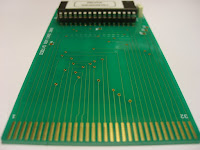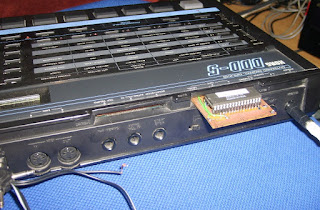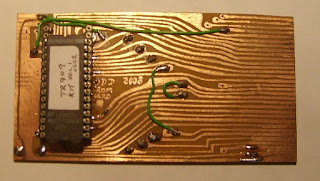ROM
CARD and ROM CHIP DEVELOPMENT
ARCHIVE
ARCHIVE
On this page, you will find photos
and info on the development of the Rom chips and the PCB expansion card.
Many years ago KORG and METRASOUND used to sell ROM cards for the DDD series of drum machines,but these have been long discontinued and are now very rare.
The KORG DDD1 and DDD5 were some of the best drum machines made in the 1980's
and it seemed a shame that it was no longer easily expandable.
The idea was to add new sounds to the DDD series and expand it's usefulness in modern music production.
The Picture
BELOW shows the hand made prototype PCB ,designed
to
simply slot into the DDD drum machines, eliminating
any
need for opening up the DDD machine.
It
works just the same as a "normal" ROM card.
So
far it works OK with a UV erasable EPROM
Here,
the TR909 ROM is mounted on the PCB.
The rom chip contains a couple of snares and kicks, 2 hi hats and a clap sample.
This
is now added to the TR909 ROM and the "Beatbox " ROM already
done.
So
far all the testing has been done using a Chip socket mounted
on some VERO BOARD
which
is wired into the main PCB on the DDD1, the Vero board sits in the space
where
the battery for the sampling PCB would go.
We
chose this method as its the most convenient way of testing and
inserting /removing chips
without
having to open up the DDD1 all the time.
The
picture below shows the TR909 Chip in place on the Prototype "test"
board
The idea to make this into a "kit" was
abandoned because it was difficult to fit the board to the
main board inside the DDD1
this was mainly used for testing the rom chips , before the PCB was made.
this was mainly used for testing the rom chips , before the PCB was made.
After the chips were tested and working the PCB was next:
" Now
we have to concentrate on the PCB, and that is going to be
tricky
and
we want to get right, also we're not sure how a pcb
is going to hold up
to
being pushed in and pulled out of the card slots all the time,
(a
bit like the old Commodore 64 and VIC20 cartridges in the 80's)..."
HOME







